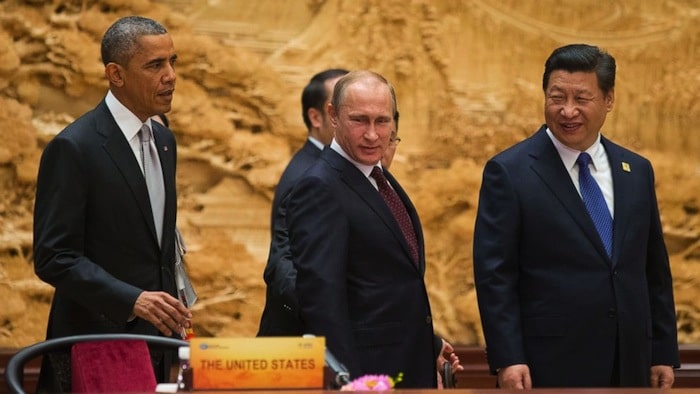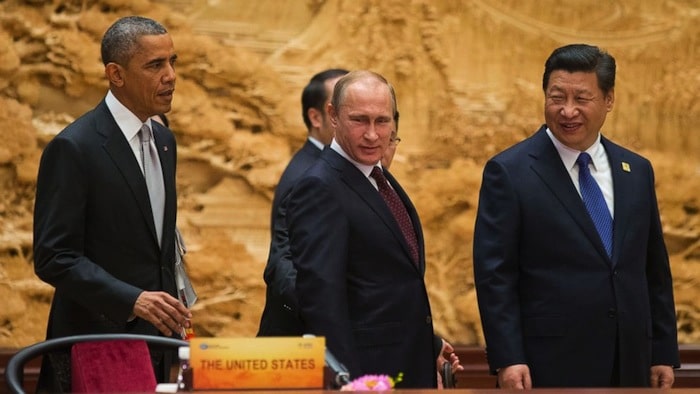The United States, the lone superpower, has presented two draft resolutions to the UN Security Council on the North Korea problem and Syrian conflict respectively (here and here) – based on the understanding it reached through two water-tight bilateral consultative processes with two ‘half-superpowers’ – China and Russia. Now, don’t two halves make a wholesome one? Welcome to the new ‘bipolar’ world order.
Just as Beijing would have been taken by surprise at the US-Russian deal on Syria, which came out of the blue last Sunday, Moscow would take note that Washington and Beijing simply set out the road map on North Korea sanctions without taking Russia into confidence. But neither China nor Russia can complain because the lone superpower managed to make each feel special its own way.
A Russian diplomat in New York has promptly promised to study the draft resolution on North Korea sanctions. Beijing took a little extra time — almost two days — to issue a statement welcoming the US-Russian deal on Syria. The foreign ministers of Russia and China are not known to have spoken to each other even once during this past eventful one-week period although both claim to “co-ordinate” their foreign policy moves, while both nonetheless clocked several hours with their American counterpart.
It will be a signal achievement of the US diplomacy if it has succeeded in inserting itself laterally into the much-vaunted Sino-Russian entente. At any rate, Washington has brilliantly capitalized on the intense craving felt in Moscow and Beijing for somehow engendering an uplift in their respective ties with the US.
Moscow is obsessed with getting the western sanctions against it lifted, which have seriously hurt its economy and may produce social unrest if the deep recession continues, whilst for Beijing a host of considerations come in, both short term and medium term, ranging from the deployment of the US missile defence system in South Korea to the spat in the South China Sea to the futuristic project of the “new type of relationship” with America.
On the other hand, both Moscow and Beijing also may have succeeded in driving some wedge between the US and its regional allies in the Middle East and the Asia-Pacific regions. No doubt, Turkey and Saudi Arabia have not liked the US-Russia deal on Syria; nor will South Korea and Japan feel nice about the deal struck in Washington during Foreign Minister Wang Yi’s hugely successful 4-day trip to America.
In turn, Moscow and Beijing would face a ticklish situation by entering into such deals on the quiet with the US over the heads of their friends. Of course, Russian Defence Minister Sergey Shoigu was rushed post-haste to brief Iran about the US-Russia deal. Nonetheless, it is premature to fathom the degree of enthusiasm Tehran would have in merely tagging along on such a vital issue that impacts on its core interests. Interestingly, President Vladimir Putin phoned up his Iranian counterpart Hassan Rouhani to follow up on Shoigu’s meeting with Rouhani two days earlier.
Looking ahead, striking deals is one thing, but getting them implemented could prove to be an entirely different thing. Do the Americans, Russians and the Chinese think that if only they agreed on something, others should simply abide by it? Countries such as Turkey, Iran, South Korea and Japan are intensely nationalistic.
Most certainly, Japan’s latest overture to Russia is a reflection of its disenchantment with the US’ “rebalance” in Asia. (See my blog Abe snubs Omaba, will apologise, but see Putin nonetheless.) Again, the decision by Saudi Arabia and Qatar to form a de facto cartel with Russia and Venezuela to regain control of the oil market cannot but have geopolitical implications. We may expect more realignments at the regional level in both Middle East and Asia-Pacific.
The good thing is that the Obama administration is signaling interest in a new spirit of ‘multilateralism’ in the US’ regional policies by accepting the role of Russia and China as ‘equal’ partners. The bad thing is that Obama’s successor may not feel obliged to follow his path. On the other hand, in the new ‘bipolar’ world order, the US also keeps the prerogative to be selective in choosing its interlocutor, depending on the exigencies of the situation and taking into account its self-interests. Thus, in Syria, it pays to carry Russia along, while in the case of North Korea, Washington seems to consider Moscow to be a marginal player (although Russia and North Korea actually share a common border.)
It will be interesting to see how China and Russia get accustomed to this new pattern of ‘selective engagement’ by the US. The resurgent Russia will be satisfied with nothing less than a veritable global partnership with the US while China too in the most recent years has shown keenness to ‘shoulder international obligations’.
Washington is, obviously, feeling greatly elated about the deal with China on the North Korea sanctions. China has reason to feel satisfied, too; conceivably, the deployment of THAAD missile system in South Korea may be put on the backburner and the US will not provoke China over the South China Sea issues.
But what does Russia gain out of the deal on Syria? Maybe, Moscow won the war in Syria? Of course, Putin did the victory lap – while Obama said, well, nothing.
Ambassador M. K. Bhadrakumar was a career diplomat in the Indian Foreign Service. His assignments included the Soviet Union, South Korea, Sri Lanka, Germany, Afghanistan, Pakistan, Uzbekistan, Kuwait and Turkey.
Reprinted with permission from Indian Punchline.


